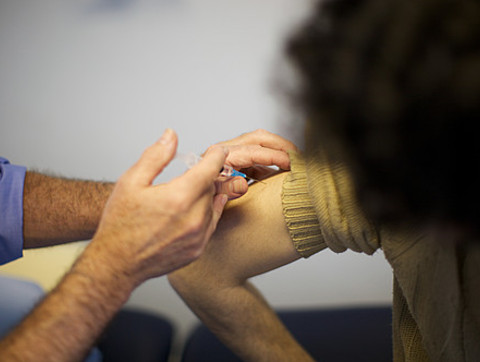Public Health England (PHE) is calling for teenagers to get the MenACWYvaccine as cases of meningococcal

Unique ID: UCLH_ DAY 3_VACCINATION 35
Caption: A close up of a staff member giving an injection, innoculation, vaccination using a syringe needle, to a patient. A routine health promotion, health protection measure. Immunization.
Restrictions:
Copyright: ©
disease, that can lead to meningitis and septicaemia (blood poisoning), are anticipated to spike in the winter months.
All teenagers aged 18 and 19 (born between 01 September 1996 and 31 August 1997) are eligible to receive the vaccine for free regardless of whether they’re studying or pursuing other activities.
PHE figures show that cases of meningococcal disease peak each year during winter.
The meningococcal infection spreads through close persistent contact with people who unknowingly carry the bacteria, and so PHE is urging students to take up the vaccine during their university break before GPs surgeries close for Christmas: before they return to university and halls of residence, where they are often in close contact with many other students.
Meningococcal bacteria can cause meningitis (inflammation of the lining of the brain) and septicaemia (blood poisoning). Both diseases are very serious and can kill, especially if not diagnosed early.
The call for students to get vaccinated follows the introduction of a newMenACWY vaccination programme in August that offers teenagers protection against four common meningococcal strains.
The MenACWY vaccine was introduced this year in response to a rapid increase in cases of a highly aggressive strain of group W meningococcal disease. Cases of MenW have been increasing year-on-year, from 22 cases in the 2009 to 2010 season to 176 in 2014 to 2015 season.
It is currently responsible for around a quarter of all laboratory-confirmed meningococcal cases in England.
Dr Mary Ramsay, Head of Immunisation at PHE said:
As students head home for the winter break, we urge them to contact their GP to get vaccinated, if they haven’t already done so.
Think of it as an early New Year’s resolution and keep yourself and your friends safe by getting vaccinated.
Joanne Yarwood, National Immunisation Programme Manager at PHE, said:
As a mum of teenagers, I know how busy their lives can be, and so I urge all parents of 18 and 19 year olds to put a MenACWY vaccine on their family’s list of essential things to do before the festive holiday period. Meningitis can be deadly and survivors are often left with severe disabilities as a result of this terrible disease. Encouraging your son or daughter to have the MenACWY vaccine could save their life, or prevent them from permanent disability.
Dr Ramsay added:
We must all remain alert to the signs and symptoms of meningococcal disease and seek urgent medical attention if there is any concern. The disease develops rapidly and early symptoms can include headache, vomiting, muscle pain and fever with cold hands and feet.
Be aware of all signs and symptoms and trust your instincts: don’t wait for a rash to develop before seeking urgent medical attention.
Sue Davie, CEO at Meningitis Now, said:
We echo Public Health England’s timely reminder to get students and young people vaccinated against Men ACWY. There has already been a number of cases of meningitis amongst young people since the start of the new university year and I would urge parents to do whatever it takes to get their children immunised and protected whilst they are at home during the festive period.
Vinny Smith, CEO at Meningitis Research Foundation, said:
As Christmas draws near, we are also approaching the peak time for meningitis and septicaemia. This is a great opportunity for students who haven’t already had the MenACWY vaccine to start the New Year protected against this deadly strain. But remember, meningitis and septicaemia strike fast, and some strains can’t be prevented. It’s important to know the symptoms and be prepared to act quickly if you get ill or if you are worried about someone who is ill."

